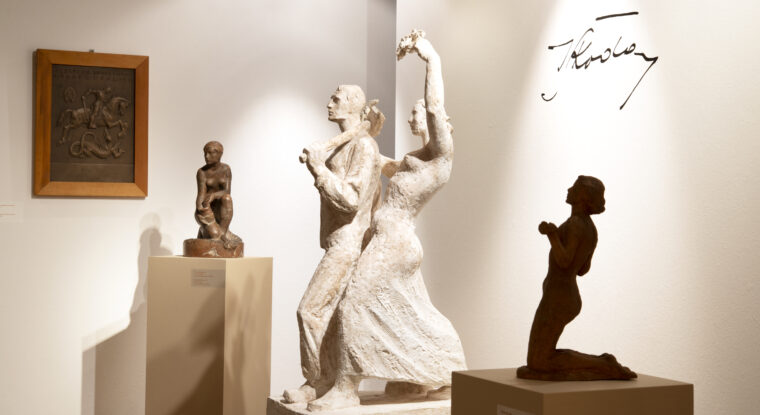Statues and Statuettes: Josef Václav Škoda presents a cross-section of Josef Škoda’s small-scale sculptural works from the 1920s to the 1940s. It includes works made from a variety of materials such as stone, bronze, pewter, wood, terracotta, limestone, or plaster, alongside several of his drawings. The exhibition follows on the recent showing of Traces of Bronze and Stone: Josef Václav Škoda at GMU’s Vladimír Preclík Gallery, which explored Škoda’s important works for public space in the town of Hradec Králové and its environs. This latest exhibition at GMU features an intervention in the form of a painting by Bohumil Kubišta (Portrait of Václav Rejchl, 1908) and a sculpture by Karel Nepraš (The Confluence of the Elbe and the Vltava As a Grade-Separated Junction, 2000–2001), which will be installed in the gallery’s lobby until 9 June 2024.
“The form taken by Škoda’s statues is never there just for its own sake. His sculptures’ main mission is their content, to convey an idea, and it is this which determines the particular manner of execution. Form flows from content and function, and it does so in such an objective way that it is accessible to anyone with open eyes and an open heart.”
(The Life of Academic Sculptor Josef Škoda, catalogue to posthumous retrospective exhibition, Hradec Králové, 1951)
The exhibition was supported by the Ministry of Culture of the Czech Republic and the Statutory City of Hradec Králové.

FROM LEFT: artworks of Josef Václav Škoda, RELIEF OF ST. GEORGE FOR THE HRADEC KRÁLOVÉ EQUESTRIAN SOCIETY (1934); WOMAN WITH EWER (1934); FORWARD! (MODEL OF SCULPTURE FOR THE 9TH PARTY CONGRESS OF THE COMMUNIST PARTY OF CZECHOSLOVAKIA) (1949); KNEELING NUDE (1941)